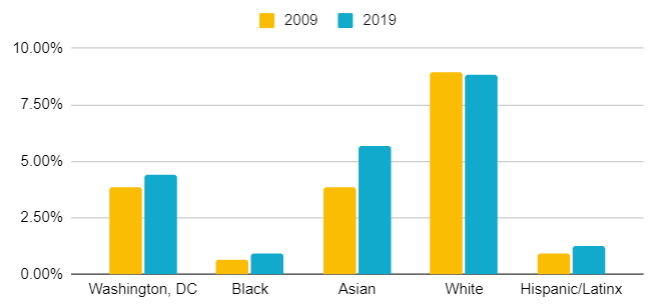
This report is part of a multi-market, data-driven series on how tech economies are growing wealth in U.S. cities. See an explainer on the data behind this reporting.
Although he’s long since passed the six-figure mark in annual salary, DC technologist Johnny Ray Austin said that in his first-ever tech role at Lockheed Martin, he had no idea how much he should even ask for.
“Especially out of college, it was still the most money I’d ever made in my life … at like $55,000 a year,” Austin said. “But it felt like a lot more. So I took it, no questions asked.”
Since that first break, Austin has gone on to roles with some of DC’s largest tech teams at firms like edtech company EverFi, mapping software provider Mapbox and digital agency iStrategyLabs. These led to his current position as CTO of rent payment startup Till, a role that he said brings him over $200,000 in salary each year.
While it might have seemed like a mind-boggling number to straight-out-of-college Austin, he said he was able to reach the bracket when he learned to negotiate offers after his first few gigs. Eventually, it paid off big time.
He’s not alone, either. With the District’s well-known high cost of living playing a part in every offer and strong tech industry growth, DC has seen growing competition in its compensation offerings for technologists.
What was once a town known for stable government jobs is now a place where high-growth companies are putting down roots, attracting mega-rounds from big-name investors and getting in the race to build high-performing software teams. It means the region is home to a group of companies looking to attract new talent, and working hard to keep effective team members that are already onboard.
For some technologists, like Austin, the DC frenzy has paid off. By navigating the market, they’re able to attain a new level of wealth, even without founding an uber-successful startup. To find out who’s who and put numbers behind this growth, Technical.ly took a look at who’s making the high-end of salaries in DC — which we deemed over $200,000 in salary alone annually, the threshold required to become an accredited angel investor — and how that’s changed the city during the tech boom of the past 10 years. This is the beginning of a reporting series based on the data. (Check out the methodology on GitHub.)
Stories like Austin’s show how earners across the District are able to reach a level of wealth only known to a small percentage of the population in salary growth alone. According to the Technical.ly data, 2,927 Black earners in DC made over $200,000 in 2019, and tech is able to take some of the credit. But looking at this top tier, white earners still have a huge leg up on any other group, even though the numbers are showing growth among BIPOC professionals making over $200,000.
It means there is opportunity for BIPOC workers to reach new levels of wealth as they grow a career. But for some, achieving true, holistic wealth means looking outside of salary and closer at what’s really being offered beyond the paycheck.
So, what does it really come down to? There’s money to be made in DC. But, for technologists, overall wealth and equity in the workforce means a lot more.
Gaining high earners
We’ll start with the stats. According to Technical.ly’s data analysis, 4.42% of DC’s population, or an estimated 29,688 people, made over $200,000 annually in 2019, compared to 3.83% — or 21,593 people —in 2009.
But when it comes to the percentages within the percentages, not everyone is getting a fair slice of the pie. Black earners making over $200,000 grew from .62% of the Black population in 2009 to .91% in 2019. That means the number of Black high earners went from 1,930 to 2,927 people in a decade. Of the Asian population, the number increased from 833 high earners, or 3.86% of the population in 2009, to 1,571, or 5.69% of that population in 2019. Of the Latinx population, 3.97% — 2,192 people — were high earners in 2009, but it moved up to 4.65% in 2019, or 3,545 people.
Meanwhile, although the percentage of white high earners decreased from 8.93% of that population to 8.81% in 2019, they’re still miles ahead of any other earner group. There were 25,178 white high earners in 2019.
Salaries, though, are more than meets the eye. In a new, remote-first world, candidates are thinking about more than just what’s on their paystub every few weeks. And while change is (slowly) coming, when it comes to how much people get paid, there’s still a prominent gap for BIPOC technologists compared to their white counterparts.

A visualization of high earners in DC, 2009 and 2019. (Technical.ly image)
Who makes $200K in tech?
When it comes to gaining wealth, salary is a key building block for reaching the upper echelon. In DC, the top tier of the ladder climbs especially high.
According to Matthew Deneroff, DC branch manager for Robert Half Technology, salaries in the District are about 33% higher than the average of the US. While it’s still not quite up there with New York and Silicon Valley, he said DC is one of the top 10 cities hiring for IT workers, which means a huge demand. Combined with the high cost of living, it drives higher salaries more than other cities of its size, or larger.
“In general, the cost of living here is high,” Deneroff told Technical.ly, and “because the demand for that talent is so great, salaries kind of reflected that over the years and it keeps increasing.”
Still, the earners making over $200,000 in tech tend to be found at the top, either in management-level or C-level roles. These include roles like chief information officer, chief digital officer or chief security officer. Those in the C-suite are likely going to go over that number on average, though, whereas management-level positions like VP of information technology will hover right around the $200,000 mark, Deneroff said.
On the more technical side, you might see high-earning in positions like application architect or data architect, albeit at the top-tier. Senior software engineers or data scientists may have a total compensation package that equals $200,000, he added, but not the salary alone.
And although employers like nonprofits, education orgs, media conglomerates and other non-tech companies can host tech roles, Deneroff said they’re not the ones paying the high salaries.
“Obviously, it’s all heavily dependent on size of the organization, or whether it’s a not-for-profit, private firm,” Deneroff said. “In general, I would say the tech companies are paying more for their talent because they build out a product.”

(Graphic by Sabrina Vourvoulias)
Hilliary Turnipseed, founder and president of talent consulting firm Hill Street Strategies, agreed, noting that any offer she’s made over $200,000 has been on the leadership side or building the product architecture, no matter the company size.
As for who these earners are, at both growth and startup businesses, it’s exactly who you might expect. Despite the fact that white high earners went down while Black earners went up over the decade, there are still nearly 9% — or 25,178 people — white earners making over $200,000, compared to less than 1% of Black earners, or 2,927 people.
This hits on an important point for salaries in DC: Despite the increase among Black high-earners, there’s still a huge disparity that exists in payment. And although DC technologists might make a little more than some nearby cities, there’s still a salary gap across racial lines.
“I think it really boils down to, who is getting these over $200 [thousand]-plus roles?” Turnipseed said. “White men, mainly.”
So what influences salary, anyway?
Tech isn’t the only area where there’s opportunity. Among those making over $200,000 in DC, the largest industry was actually legal services in 2019, at 18.29% of the high earners. That’s compared to 3.38% of computer system design and related services, according to Technical.ly data. Professional management, scientific and technical consulting made off a little better, making up 9.26% of these top earners.
DC’s tech boom comes against the backdrop of a general rise in wealth throughout the metro area from 2009 to 2019. Overall, there’s definitely been a boost in the number of high-earners over that time frame (29,688 people earning $200,000 or more in 2019 compared to 21,953 in 2009, to be exact). The growing number of Black and Latinx residents in the high-earner category were in line with that trend.
In tech, Austin thinks the increase might be due to growth of venture-backed companies in DC over the same time period — those growth companies that reach Series B and C rounds, then grow teams quickly. Just in 2021, DC has seen record-breaking numbers of capital raised, including its highest overall investment level in 20 years with $1.24 billion raised in the first quarter of 2021 alone, only to top that with an all-time high of $1.27 billion in Q2. In all of 2020, the area raised just under $2 billion total.
“A lot of that money drives up competition, salaries go up and then cost of living,” Austin said. “Just the influx of startups and venture-backed companies coming in have been a major contributor there.”

(Courtesy photo/image by Technical.ly)
Marquet Reid, a front-end engineer at Element 84, has yet to break the six-figure salary mark for his role. But he told Technical.ly that, for many, he has noticed a real jump in compensation only comes when people move to another company. Even after receiving degrees, certifications and promotions to senior levels, raises stay around a few percentage points, feeding the talent frenzy and poaching from other companies. That means that the competing offers, at minimum, need to keep up with the skyrocketing rent prices in order to even be considered.
The raises in question, Reid noted, also tend to be based on cost of living, with add-ons for exceptional work, meaning that location definitely has an impact on what local companies are offering in compensation.
“In order to have engineers want to stay and do their work, I think that’s a major backbone for a lot of companies,” Reid said. “They have to stay competitive or people are going to go to other cities where they can get paid more. So I think they kind of have to keep up with the cost of living here.”
Location, location, location, however, is not the only thing companies have to consider when hiring. By going after the same people from the same networks and talent pools, Turnipseed said, companies are actually forcing the city’s higher salaries and creating a candidate market where businesses are courting the potential employees, not the other way around. In reality, she said, there are more candidates out there than people realize who want and need different things.
In terms of “how compensation is defined, I think a lot of that is changing right now,” Turnipseed said. “And it is definitely still a candidate market. I believe there is no pipeline problem. It is very much a people problem and a lot of it is this unwillingness to look outside of your trusted network or understand what it is that’s important to individuals in an opportunity, because it’s not a one-size-fits-all approach.”
But at the end of the day, Austin noted, a salary will primarily be based upon how much a company values you and your worth. And it might not be as simple as bigger company equals bigger salary. A smaller startup might be willing to pay you more because they need you more than a larger corporation and pay at a premium, he said, even though it likely has more resources.
“People think that there’s like a magical number but, in fact, there really isn’t. It depends on a lot of different factors,” Austin said. “People always say ask for what you’re worth. But you know, this is a marketplace, so you’re only worth what someone is willing to actually pay you.”
These days, it’s all about overall compensation
When you factor in the presence of big firms, the proximity to multimillion dollar government contracts and the hot, VC-backed market, it’s safe to say there’s money to be made in the DMV. And with options in bigger entities and startups, a cybersecurity hotspot and the massive growth of Northern Virginia’s data centers, DC has done its part in making the region attractive to talent.
Despite the overall bump in offerings, though, salary is not the end-all, be-all factor for technologists that it once was, Turnipseed said. Especially at a time when changing companies doesn’t require leaving a city, candidates, she said, are asking about additional perks like stock options, bonuses and whether or not they’ll be able to work from home. And candidates know what to look for and where to look for it, like asking about equity if they’re considering a position in an early-stage company.
“The money piece, it’s sort of assumed that’s going to be there because that is the tech ecosystem,” Turnipseed said. “And how compensation expectations are defined, it really is based on the stage and size and that impacts that candidate’s expectations … So it really depends on the organization, and that then triggers what they really feel is a fair compensation rate.”

(Courtesy photo/image by Technical.ly)
Where folks are spending their time also matters more than ever. Turnipseed noted there’s a renewed interest in company culture and wanting pride in the product that you’re building. More and more, companies are taking stock of their role in the community around them, and employees are noticing.
“It used to about be your cost of living — can you afford rent? And that’s not a thing anymore,” Turnipseed said. “It’s, what problem am I going to solve? How are you going to set me up for success? And how are you going to see me as a human being?”
But the question of how tech can actually boost equity in the District is one that still needs answers. DC has raised a flag for inclusive growth as it builds an innovation ecosystem. How this plays out among earners, though, remains to be seen. There is work underway to create pathways, from K-12 curriculums to bootcamps to workforce development programs expanding diversity in the industry.
Yet, at the top, the salary discrepancy between Black and white breadwinners is still there. And if companies continue to make the issue worse by going after the same talent and forcing more competitive compensation only among a few individuals, equity will get left behind.
Toward equity
For the professionals already in these companies, equity doesn’t end with a hire or a salary. It’s just a starting point.
When you factor in additional salary perks that tech is known for (say, the ability to work from home or flexible hours which allow parents to stay home and save money on childcare), there are plenty of other points to consider. The flexibility of the industry and its ability to provide employees with benefits like a stake in a company or the chance to make additional bonuses and funds through contracting, offer assets that might not be seen in a bank statement.
Beyond fair pay for everyone, when it comes to the choice between offering a competitive salary or amped-up benefits to BIPOC candidates, Turnipseed said that it will likely depend on the candidate and what they value. Whether it be a work-from-home stipend upon hiring or a bonus check and a chance to show up to the office IRL, it’s up to employers to feel out (or simply ask) what future employees are seeking.
But the most important thing, she noted, from hiring and throughout employment, is making people feel like they have worth as a human.
“What we don’t want to feel, as someone from a marginalized group, is that we’re being taken advantage of,” Turnipseed said. “I feel like, as it relates to compensation, equity is really about folks wanting to feel like they’re being heard and valued.”
_
This is the first in a series on how tech economies are growing wealth in U.S. cities, and we need you to be part of it. What do you know that we don’t, or what do you think we need to come to understand about the topic? Email Technical.ly CEO Chris Wink at chris@technical.ly or Technical.ly Managing Editor Julie Zeglen at julie@technical.ly if you have any questions, additions or thoughts.
Join the conversation!
Find news, events, jobs and people who share your interests on Technical.ly's open community Slack

DC daily roundup: the DMV's VC cooldown, SmartSigns for safer driving; Rep. Schiff's AI copyright bill

Will the life sciences dethrone software as the king of technology?

Delaware tech leaders gather at White House for action summit with Biden and Harris


